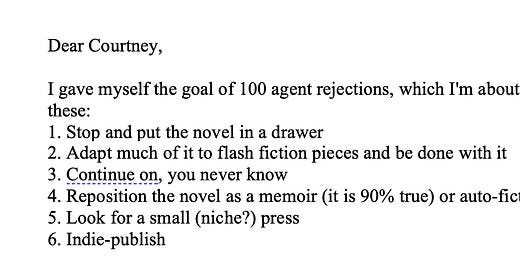How many agent rejections should I stomach before giving up?
And do I have to give up?
This week, we have a question from a subscriber and writer named Jesse, who asked the following:
Before I get into my answer (which I got Jesse’s permission to share with everyone) I’d love for us to revisit what rejections actually mean. Oftentimes, you can’t tell what the hell they mean, because you never get a response to your query, or you get a rejection that is so basic, you can’t tell why you’re being rejected.
I wrote a previous post that gets into rejection hierarchy, which I suggest revisiting so you understand where I am coming from in the rest of what I write. In terms of a visual, however, these are the possibilities when you query an agent or editor:

I’m not going to pull punches. 100 agent rejections is a lot. If you’ve ever had a private consultation with me, you’ll know that I recommend (ahem, insist) on writers querying in modest batches: like 6-12 agents at a time. I call that a “round.” When you’re querying thirty, forty agents in one go? That’s a blitz. It’s a one-size-fits-all approach that rarely works, and it leaves no room for editorial refinements based on the feedback you’ve received.1
Using the above hierarchy, whenever you receive a batch of rejections, you should separate them into categories. If you query twenty agents, get form rejections from six of them, radio silence from three of them, and personalized rejections from the remaining eleven, you’ve actually piqued some interest— there is something in your manuscript that’s working. It’s not one hundred percent there yet, but you got some top agents to sit up and take notice. With this kind of breakdown, you’ll have some sense of where you stand, and whether you should move forward. (You should! But you should also be preparing yourself for a probable revision request.)
If you query twenty agents and get form rejections from twelve of them and radio silence from the remaining eight, that’s not great. There wasn’t anything in your submission that made an agent sit up and take notice. They didn’t take the time to give you a kernel of feedback. A kernel of feedback is worth its weight in gold.
So let’s go back to Jesse’s question. What should he do now?
Dear Courtney,
I gave myself the goal of 100 agent rejections, which I’m about to hit. Do you advise any of these:
Stop and put the novel in a drawer
With love and understanding and compassion in my heart, Jesse should have stopped and put the computer in a drawer back at twenty rejections, not the novel. I strongly think that every twelve rejections or so, you need to sit back and regroup. It might not be the novel that is the problem—it could be your query letter and/or the way you are framing the story. It could be the current climate, which is hostile—for whatever reason—to what your book is about. If you are trying to fit a round peg into a square hole, you need to know that you are holding on to a round peg.
Here are two other avenues Jesse is considering:
Adapt much of it to flash fiction pieces and be done with it
Reposition the novel as a memoir
At one hundred rejections, you’re getting a super strong message that what you’re selling isn’t wanted. If the problem is that the manuscript isn’t working in its current form, you probably would have heard this via personalized rejections somewhere in the process. That looks like feedback along the lines of, “Your bio makes it sound like this novel might have been inspired by your real life. This could have legs as a memoir. If that’s a direction you’d consider, get in touch,” or “I love the premise here but I think that, in our current climate, it will be hard to sell as a memoir. Would you consider fictionalizing the story?”
Unless you’ve gotten feedback suggesting that your manuscript might work better in another genre, I wouldn’t advise repurposing material that has been rejected 100 times. That will take you a lot of calendar time, and most likely, your efforts will also end in rejection. Think of it this way. You can do a lot of things with hamburger meat, but it’s going to have meat in it whether you crumble it on a baked potato or barbecue it in patty form. And if you’re up against a panel of vegetarians, it doesn’t matter how you present your meat.
Let’s look at some of Jesse’s other avenues:





